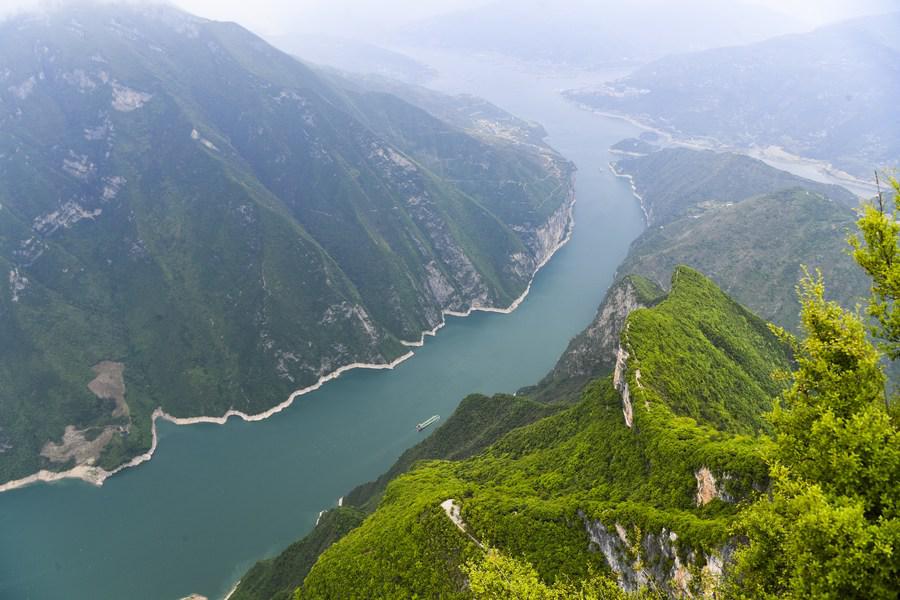Commentary: Man-nature harmony, an essential part of China's modernization

Photo taken on April 23, 2021 shows the view of Qutang Gorge, one of the Three Gorges on the Yangtze River, in southwest China's Chongqing Municipality. (Xinhua/Wang Quanchao)
In its journey toward modernization, China will strive to foster a new relationship where man and nature can both prosper and live in harmony.
BEIJING, April 26 (Xinhua) -- Chinese President Xi Jinping on Sunday reaffirmed the significance of ecological conservation during his latest inspection visit to south China's Guangxi Zhuang Autonomous Region.
Hailing the Lijiang River as "the one-and-only treasure" of China and the world, Xi said that its ecological environment should never be damaged.
During his previous inspection tour to Guangxi in 2017, Xi visited a mangrove conservation area in the Beihai Golden Bay and stressed that "the region's ecological advantages shouldn't be traded even for gold."
Ecological protection is always high on the Chinese leader's agenda. As part of his Fujian tour this year, Xi visited the Wuyishan National Park, emphasizing the need of building a nature reserves system centering on national parks to keep the ecosystem intact and protect biodiversity.
Xi's special concerns during his tours shed light on what type of modernization the world's second-largest economy is seeking to embrace from a new historical starting point.
According to the 14th Five-Year Plan (2021-2025) for National Economic and Social Development and the Long-Range Objectives Through the Year 2035, an essential part of China's modernization will be the harmony between man and nature.
In other words, in its journey toward modernization, China will strive to foster a new relationship where man and nature can both prosper and live in harmony.
It will be a tough path, a road sort of different from what mankind has ever taken. Since the industrial civilization, mankind has created massive material wealth. Yet, it has come at a cost of intensified exploitation of natural resources, which laid bare growing tensions in the human-nature relationship.
In the 21st century, however, there is a chance for countries seeking modernization to ride the trend of technological revolution and industrial transformation, to seize the enormous opportunities in green transition, and let the power of innovation upgrade economic, energy and industrial structures.
China has obviously made its choice and set itself on a course chasing the dawn of a new type of modernization.
In 2018, China incorporated ecological civilization into its Constitution for the first time. In its 14th Five-Year Plan, China has vowed to lower the energy consumption per unit of gross domestic product (GDP) and its carbon dioxide emissions per unit of GDP by 13.5 percent and 18 percent, respectively.
China has also announced its goal of striving to peak carbon dioxide emissions by 2030 and achieving carbon neutrality by 2060, which requires extraordinarily hard efforts by the country, considering the nation is still experiencing industrialization and urbanization and holds high expectations of economic growth.
With the Chinese leader's remarks "lucid waters and lush mountains are invaluable assets" spreading far and wide across the country, people have seen a change in their perception.
Trade-offs between economy and nature have been taken more as a false assumption while "protecting the environment is to protect productivity" has increasingly become a mainstream agenda.
Take the Lijiang River for instance. After local governments made all-out efforts to reduce pollution and improve the river's ecology, local residents have seen tourism booming, with hundreds of thousands of visitors attracted each year before disruption due to COVID-19.
Guilin, where Lijiang scenic spot is located, received 138 million tourists and generated consumption totaling 187.4 billion yuan (about 28.87 billion U.S. dollars) in 2019, up 26.7 percent and 34.7 percent year on year, respectively.
Achieving modernization featuring man-nature harmony is obviously more complex and challenging than treating the environment of a river. With less than 10 years left for the country to peak carbon dioxide emissions, China is faced with great challenges and has much to do.
Despite advantages accruing from consistent policy-making and formulating long-term development plans, China needs to encourage more technological and institutional innovation, curb fossil fuel consumption, advance its carbon trading market and create more market space for renewable energy, amid other efforts.
As Xi has noted, the period of China's commitment to move from carbon peak to carbon neutrality is much shorter than what many developed countries might need.
With all those challenges ahead, China has taken a path less beaten. If the country's grand vision materializes, it will be a blessing to both mankind and nature. The high-quality development which the Chinese people are seeking will show its far-reaching influence toward the future.
Photos
Related Stories
Copyright © 2021 People's Daily Online. All Rights Reserved.










